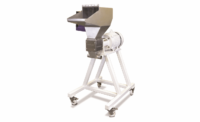Enhancing Product Quality, Consistency
By Bryan Salvage, Editorial Director
Lopez Foods will be producing superior quality pork patties for McDonald’s thanks to a newly-installed grinding system from Freezing Machines Inc.
Over the most recent Father’s Day weekend, a crack crew of technicians from Beef Products Inc. (BPI), rolled into the Lopez Foods processing plant at Oklahoma City, OK, to install one of their massive, new grinding systems. The grinding system was designed by BPI’s sister company, Freezing Machines Inc. (FMI), both of Dakota Dunes, SD.
Shuttling supplies from South Dakota to Oklahoma City required six semi-tractor trailer rigs, a box trailer, and two job trailers for the system components and materials. In total, forty-two people were in involved in the installation; some were local contractors, but most were the very same BPI/FMI technicians who assembled the system back in South Dakota.
Lopez Foods Inc. is the nation’s largest Hispanic-owned meat processing company. Among its varied processing activities, Lopez specializes in fully cooked breakfast sausage, chorizo, sliced Canadian bacon, frozen beef patties, and ham for some of the largest quick-service restaurants and retailers in the world. This new BPI/FMI grinding system was specifically ordered to assis t the processor in producing pork sausage patties for McDonald’s throughout the Southwest.
“The grinders are each capable of processing up to one-thousand pounds per minute (sixty-thousand pounds per hour), and can fill one receiving tub within nineteen to twenty-one seconds,” says Erlan Rice of BPI’s corporate electrical engineering group. Rice was responsible for the electrical control elements and operations start-up, system tuning, and operational training, which included the operational elements of the system’s clean-in-place (CIP) capabilities. “The grinding system utilizes a dual grinder design, and the grinders are designed to run simultaneously, if need be, but are normally alternated throughout the day. They can also be run independently, with the other unit serving as a stand-by.”
Rice planned to remain on site from three to four weeks after start-up to work with Lopez Foods operators on fine-tuning its new system. Dedicated service is part of the BPI/FMI mission to ensure system success.
“We don’t provide customers with a grinder system that is designed to meet every customer’s needs and ask the customer to make that system work in their particular operation,” Rice says. “This machine will be tuned, adjusted, and parts changed, if necessary, during the next several weeks to meet the specific needs in their grinding operation.
“When we grind sausage at the end of this week, we’ll program the operation, press the start button, and the system will begin producing quality ground pork,” he adds. “Lopez Foods should be pretty satisfied with these initial patties, but we have to let their operations become accustomed to the machine so they can see what it is capable of doing. The adjustability of this system, for example, where you can dial in a chewier or less chewy texture, is a major technology leap for the industry.”
The bulk of this system was in place following two long days of moving, assembling, anchoring, and adjusting. BPI brought two 10,000-pound forklifts with winches to help move the massive system components, some of which weighed thousands of pounds. At one point, more than 10 men carefully and strategically moved components on skates around two 90-degree angles on the processing floor. After reaching the installation area, seven men began inputting tubing into the equipment, while others working near the control panel in the outside hallway were setting up computer controls and connecting hundreds of wires. Fifteen people were needed to connect the system, which was guided and assisted by its own built-in rail system.
One Lopez Foods executive was very impressed.
“BPI amazes us,” said Douglas H. Strand, director of engineering for Lopez Foods, as he watched the installation from the sidelines. “They know what they’re doing, they’re efficient --- and they’re right on schedule.”
When asked why Lopez Foods chose the BPI/FMI grinding system, Strand answers: “McDonald’s and Lopez Foods have a tightly-knit partnership. We wanted product uniformity. This system gives us consistency in grind, and it is cutting-edge in its defect elimination system. We’re excited in what this system promises for our sausage texture and defect elimination capacity.”
Major features
Sausage can run from anywhere from 100 to 1,000 pounds a minute from each of the 16-inch grinder units. The major advantage, however, remains the quality of the product these units produce.
“If we wanted to put a name on this system, we could call it the Dial-a-Grind,” Rice muses. “You can dial in the texture and other sensory elements of the ground-meat mixture, how much of a bite or chew desired in the texture, as well as optimize defect [bone and sinew] removal.”
This equipment is constructed of heavy-gauge stainless steel, which is uncommon to the industry.
“We over-build our machinery so it continues running smoothly and consistently. We don’t want to be in the plant three months later fixing it.”
“The pumps and grinders turn slower, but they move more material than a conventional grinding system. They’re also more sanitary and require less maintenance,” adds Tom Woolley, BPI director of engineering and installation director. “This system is designed around zero maintenance.”
Elements of the machine are jacketed.
“We use a closed-circuit liquid loop with a variable heat control so we can dial in the exact temperatures we want,” Rice says. “The loop and jacketing system adds consistency to the machine operation.”
This machine is also built to be clean-in-place (CIP).
“After a production day, you remove the grinding orifice plates, couple up the CIP adapters [a ten- to fifteen-minute job], and you have closed-loop cleaning,” Rice says. “You simply hit ‘start’ and the CIP process begins.”
Once the grinding system is installed, it can become a control point for the customer’s entire processing system, which, in turn, helps add consistency to the overall operation.
“After initial startup, a customer might look at other aspects of the operation as opportunities to apply similar techniques” Rice adds. “In some installations, we’ve been asked to apply our integration and around-the-clock monitoring services to other parts of the operation.”
BPI plants, as well as its refrigerated warehouse and the BPI/FMI machine manufacturing operation, are computer-linked and interlinked to a an operations center at BPI corporate headquarters in Dakota Dunes, SD. Each facility communicates critical real-time information, including temperatures, times, pressures, production speeds, refrigeration and hydraulic data, and more to a central control room. This monitoring takes place 24 hours a day, seven days a week. BPI/FMI customers can also link their equipment to this operations center, which would immediately notify them should a deviation occur. This service is both secure and confidential.
“The monitoring point will call and say ‘This is outside of the parameters you set,’” Rice explains. “You can be as tight or as loose as you want to be with your parameters. We have also gotten several inquiries from companies that do not have our equipment in their plants asking if they can incorporate our monitoring service in their operation.”
Getting prepped
Early in the Lopez Foods installation, one-half dozen laptops from a portable control room were exchanging information from Oklahoma City to Dakota Dunes to help get the new grinder system set up. After being set up and running for awhile, a customer can choose to make adjustments based on output that could positively impact his entire operation.
“A customer might say, ‘This gives us exactly the same product every time the way we want it. But now we have some opportunities downstream to optimize our entire system.’ The last time we did this at another customer’s operation, they enjoyed a fifteen percent increase overall for total plant production on the day we started,” Rice says.
Theoretically, there is an unlimited number of adjustments that can be made to this system.
“The potential to what our customers can do is huge,” Rice says. “They’ll see the results. They’ll get excited about what they can do with this system and how it will impact their entire operation.”
Meeting the challenge
The Lopez Foods project marks the third installation of this particular BPI/FMI system. The installation required special attention by Woolley and crew.
“The customer did some major modifications to their own equipment that surrounds the grinder system installation,” Rice says. “They’re installing two new blenders, moving their fresh grinding line almost one foot to the side at an angle, removing old exhaust systems, and installing new exhaust systems to mate up with the new blenders. The amount of work they’re doing in this room is pretty extensive. Coordinating the efforts going on at the same time in a relatively restricted work space was the biggest challenge of this installation.”
Such a system generally takes three days to install, it’s tested on the fourth day, and production begins on the fifth day. As the installation wound down at Lopez Foods, Woolley said this project went well.
“We’re ahead of schedule,” he said with a grin during a break. “We’ll be wrapping up by 5 p.m. today, and sending people home tonight after only the second day.”
Woolley anticipates the next job will require only 22 people, and the job after that will need only 18.
Focusing on the Lopez Foods installation once again, Woolley talks about benefits.
“Lopez Foods’ maintenance staff will still need to check the oil daily, among other things, but they won’t have to work on the machine every day.” he says. “And Lopez Foods gets to monitor their entire system through this piece of equipment. It takes a lot of guesswork out of the process, and it gets you more consistent final product, which will make Lopez Foods’ and McDonald’s management a lot happier.”
Meanwhile, Lopez Foods’ Strand issues a final comment before heading off to another part of his plant. “The quality and consistency of our sausage products will be greatly enhanced thanks to this BPI/FMI system,” he says. NP
For more information on BPI's or FMI’s products and services, phone (605) 217-8000, e-mail bpisales@beefproducts.com, or visit www.beefproducts.com



Report Abusive Comment